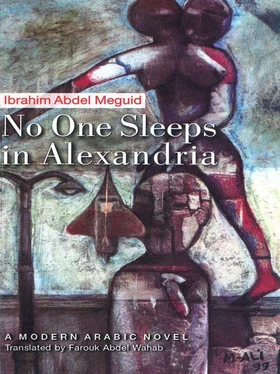Ibrahim Meguid - No One Sleeps in Alexandria
Здесь есть возможность читать онлайн «Ibrahim Meguid - No One Sleeps in Alexandria» весь текст электронной книги совершенно бесплатно (целиком полную версию без сокращений). В некоторых случаях можно слушать аудио, скачать через торрент в формате fb2 и присутствует краткое содержание. Год выпуска: 2006, Издательство: American University in Cairo Press, Жанр: Современная проза, на английском языке. Описание произведения, (предисловие) а так же отзывы посетителей доступны на портале библиотеки ЛибКат.
- Название:No One Sleeps in Alexandria
- Автор:
- Издательство:American University in Cairo Press
- Жанр:
- Год:2006
- ISBN:нет данных
- Рейтинг книги:4 / 5. Голосов: 1
-
Избранное:Добавить в избранное
- Отзывы:
-
Ваша оценка:
- 80
- 1
- 2
- 3
- 4
- 5
No One Sleeps in Alexandria: краткое содержание, описание и аннотация
Предлагаем к чтению аннотацию, описание, краткое содержание или предисловие (зависит от того, что написал сам автор книги «No One Sleeps in Alexandria»). Если вы не нашли необходимую информацию о книге — напишите в комментариях, мы постараемся отыскать её.
No One Sleeps in Alexandria — читать онлайн бесплатно полную книгу (весь текст) целиком
Ниже представлен текст книги, разбитый по страницам. Система сохранения места последней прочитанной страницы, позволяет с удобством читать онлайн бесплатно книгу «No One Sleeps in Alexandria», без необходимости каждый раз заново искать на чём Вы остановились. Поставьте закладку, и сможете в любой момент перейти на страницу, на которой закончили чтение.
Интервал:
Закладка:
The smell of onions filled the inside and outside of the little church, and the streets were filled with seated people all the way to the Mahmudiya canal on one side and Ban Street on the other, as well as up to Sidi Karim. Before the war, the lights had extended all the way to Raghib and the railroad station, the Kom al-Dikka station, which the Alexandrians called Masr Station because they could not conceive of any other town outside Alexandria except Cairo, which was called Masr. Dimyan slept in the courtyard of the church for the first time in his life. In his youth he had heard adolescent stories about how some women behaved at the anniversary celebration, and he had always thought them to be adolescent stories. That night he thought of finding out for sure, but he quickly asked forgiveness of his patron saint, Mari Girgis, and went to sit on a bench outside, amid the crowds. In the middle of the night, he went into the church courtyard and found most men and women awake. He took his place next to his wife and mother, who were asleep. He lay down looking at the sky. His eyes closed for a few moments, and he saw a great fire engulfing Mari Girgis, his friend and patron, who with his horse tried in vain to get out of the circle of fire. Dimyan got up in great panic and left the whole place. It was shortly after dawn. He crossed the adjacent streets, where people were asleep on the sidewalks, and went to the canal to breathe some fresh air. He did not go back until he had cried alone on the bank of the canal. Then he took his wife, mother and, two daughters home and went to Magd al-Din’s house. But he did not find him, so he came looking for him at the station.
The two of them had now left behind the station gate, the crowds fleeing the city, and the stench of sweat and dung of the horses and donkeys in front of the gates. They sat on the first bench they came across in the garden. The sun was up, and the air was fresh, neither cold nor warm. Dimyan realized that the open space above the square was vast and soothing.
“Did you really come to see me, Dimyan?” asked Magd al-Din.
Dimyan did not respond to the question.
“I am afraid of al-Alamein, Sheikh Magd,” was all he said. “I am very frightened.”
He raised the hem of his gallabiya to wipe some tears that had suddenly formed in his eyes. Magd al-Din was quite astonished at his friend, whom no one would believe had the soul of a lonely little child. Dimyan told his dream to Magd al-Din, who in turn was afraid, but for Dimyan himself.
“Where can we go, Dimyan? There’s nothing for us except the preordained, which no one knows. As the Quran says, “No soul knows what it will earn tomorrow, and no soul knows in what land it will die.”
Dimyan felt sorry as he saw the traces of tears in his friend’s eyes. He really should not have caused him additional worry now, but should now find a way to take his mind away from worries. He said he had learned how to read and write and would buy the newspaper for the first time and read it. Magd al-Din, still sad over his separation from his family, said nothing.

Magd al-Din and Dimyan’s last night was Easter eve, on which Dimyan went with his family to church, as did Khawaga Dimitri, Sitt Maryam, and Yvonne. Magd al-Din stayed in his room. Had all that really happened since he left the village more than a year and a half ago? Had the world changed to that extent? Had all those catastrophes and events really taken place? Had he really met all these people? It seemed to him that the time that had passed between his leaving the village and this night was no more than one day and one night, or maybe just one day, or one night, one hour, or the blink of an eye. But that day, the day he had left, had sailed far away into memory. So it must be much longer than it really was, not shorter than a day. The short man who had come with him on the train had said the raids might reach Alexandria if Italy declared war, and that he and his friend were coming to Alexandria on the very day the war had broken out. Where could he find the short man and his friend now? they must have gone back. He had heard them saying that they would not spend more than a year in Alexandria, but the raids began before a year was over. Were they alive, or had they been killed in the heavy raids on the city? There Magd al-Din was, having seen all the raids, now going to al-Alamein, to the desert where fighting was going on. Al-Alamein, ‘the two flags,’ is a strange name, but it sticks in the memory, imposes itself indelibly on the cars. When he arrives at al-Alamein, will the war continue? When he arrived in Alexandria, the scope of the war grew larger and engulfed the whole world. They say the German army that landed in Libya was different from the Italian one.
Several events had taken place in the world the last few weeks. Bulgaria joined the Axis, and German troops entered the country to attack Yugoslavia and Greece. Italy lost seven battleships in one maritime battle with British warships in the Eastern Mediterranean, and nine hundred Italian sailors were taken prisoner. Miss Denise Musiri donated bonds at a face value of thirty thousand Egyptian pounds as an endowment to be administered by the Royal Endowment Department for the funding of educational projects. That prompted King Farouk, who had recovered from a long spell of indisposition, to issue a royal decree accepting the endowment and Miss Musiri’s conditions, and conferring upon her the Order of Perfection in order to encourage her and others like her to keep making such donations for scientific and humanitarian projects. Miss Musiri said that she could not forget the kindness of the late King Fuad I toward her father, Elie Musiri, which enabled him to achieve what he had achieved in industry and agriculture in Egypt. At the same time, a branch of the Egyptian ministry of justice announced the vacancy of three positions; four hundred persons applied for the jobs. King Farouk donated one thousand pounds for the Day of the Poor, which was chosen to commemorate the death of his father at the end of April. The film The Mark of Zorro was screened for the first time in Egypt. The birthday of the Prophet Muhammad was celebrated with Quranic recitation at the Young Muslim Men’s Association. Once again streetlights were not permitted on the occasion. The British and Indian armies advanced on Asmara, where the Indian soldiers staged great victories. The United States seized sixty Axis ships in its own and in South American harbors on the pretext of protecting them from sabotage by their sailors, then arrested the sailors. General de Gaulle arrived in Cairo for the first time from Khartoum, after visiting the Free French troops, which had contributed to the liberation of the town of Keren in Eritrea. Together with the Indian forces, the Free French were largely instrumental in liberating that town in particular, after seizing Asmara, the capital. The general was received at Cairo airport by General Wavcll, commander in chief in the Middle East and a representative of Sir Miles Lampson and Baron de Benoit, chairman of the National French Committee in Egypt, together with key committee members. Afterwards, De Gaulle visited Abdin Palace, where he signed his name in the guest book, then held meetings with the prime minister, the British high commissioner, and the military commanders of Free France in Egypt. He traveled to Alexandria, where he spoke before the Free French Club on Nabi Danyal Street and visited the camp of the Polish forces, praising the support that the Free French were receiving from the Poles. The band played the French, British, and Egyptian national anthems, then de Gaulle left Alexandria for Cairo and London. There was a shortage of sugar in Alexandria, and the local population complained bitterly, whereupon the governorate of Alexandria intervened by bringing in large quantities of sugar from the south. The shortage was over in a few days. A coup d’état was foiled in Italy. The coup was engineered by Marshal Badoglio, who sought asylum in the king’s palace, where the king kept him under his own royal guard, so it was more like a prison, but at least he was safe from Mussolini’s wrath. Mussolini arrested Badoglio’s men and sent them to the Albanian front. The comedian Ali al-Kassar screened his film One Thousand and One Nights in Cairo. Another crisis erupted in Alexandria, where the shipments of grain from the countryside to flour mills were delayed. Once again, as it had done in the case of the sugar shortage, the government acted quickly, setting aside special freight trains for grain shipments. Four young men robbed a poor cart driver who was out late at night and took his cart and donkey. A young man stabbed his friend, a barber, and almost killed him. He admitted to the prosecutors that he had been unemployed for a long time and that the barber, an old friend, knew his situation so he gave him free shaves and haircuts. The perpetrator got used to that. One day he brought a friend of his that the barber did not know and asked the barber to give him a free haircut too, for the sake of their friendship. But the barber let him down in front of his friend, and so the man became enraged and stabbed the barber with a knife. When the prosecutor asked him why he had brought someone to the barber for a free haircut, he said he was also unemployed and could not find a job. Then he added that in reality, he planned to take a half-piaster secretly from his friend, instead of the full piaster the barber would have charged him. The Hungarian prime minister, who could not acquiesce to German wishes and could not resist them, committed suicide. Germany deployed twenty-two divisions on the borders with Yugoslavia, then the planes bombed Belgrade, and Germany declared war on Yugoslavia and Greece simultaneously. German planes first flew over Belgrade on the morning of the sixth of April, and for three days methodically dumped their bombs on the capital in such a tactically meticulous manner that they flew fearlessly close to the roofs of high buildings. The city was so devastated that on the third day, when the raids ended, the bodies of twenty thousand of its citizens filled the streets or were under the rubble. The wild animals, set free when the zoo was hit, went on a rampage, deyouring bodies of the dead and the living in a city that experienced horror at its worst. At the same time, the German troops were overrunning Yugoslavia from all sides, and the country surrendered after seven days. Hitler had called it “Operation Punishment,” after which he moved immediately to attack Greece, successfully implementing his policy of “one enemy at a time.” The British forces could not protect Greece. The British troops, which had gone in from the east to aid the Greeks, numbered fifty thousand soldiers, of whom eleven thousand were killed, wounded, or taken prisoner, in addition to the casualties on the Greek side. The English, however, managed under the pressure of the German offensive to safely evacuate the rest of their force, in addition to ten thousand other Greek, Yugoslav, and Cypriot nationals. At the same time, the British army retreated before the new German forces in Libya, and the battles reached the vicinity of Sallum after the British lost their former strongholds. The Axis forces began attacking the base in Tobruk. The vice bureau recorded the following arrests throughout Egypt: 850 beggars and cigarette-butt collectors, forty-six thugs and pimps, fifty women, including twenty minors, for incitement to vice on the street. There were thirteen cases of gambling and wagering, eight suspected brothels, fifty-three employ-ment offices suspected of being fronts for prostitution, and fifty boarding houses accused of the same. The British forces in Tobruk stood their ground and took thirty German officers and one thousand soldiers and petty officers as prisoners of war. They were shipped by train to Alexandria, where the workers saw them for the first time. They had seen many Italian prisoners of war before, but that was the first time they saw the Germans, who had remained an enigma since the outbreak of the war. They saw that they were very white, with blond hair and blue eyes, and tall and healthy. From the cars of the freight train, they looked at everything in indifference and disbelief. The king of Greece and his crown prince moved the capital to Crete, and the king sent his people a message asking them to remain united, undivided, and free. The German forces entered Athens, and a young man in Alexandria committed suicide by throwing himself from the top of the Icarus Hotel, and two young women threw themselves in front of the Rami streetcar on Alexander Street. Sadness gripped Alexandrians, who sympathized with their Greek and Cypriot neighbors. Gold relics were discovered in Greek tombs in Kom al-Shuqafa. The film Forever, starring Fatma Rushdi and Sulavman al-Gindi, was screened at Cinema Concordia and Si Umar, starring Nagib al-Rihani, at Cinema Majestic. The United States decided to build four hundred battleships, nine hundred ships, and a huge number of airplanes for the Allies that year. Dimyan bought the weekly al-Akhbar and went to Magd al-Din at home the day following Zahra’s departure and asked him to hear him read the news written in small print, not just the easy headlines. He read, “Death of a Well-off Maharaja in London,” then paused for a moment and resumed, “Our correspondent in London informs us that a well-off maharaja has died in London.” Then he paused, looking at Magd al-Din, who asked him to finish, but Dimyan said, “That’s it — there’s just a headline and a news item.”
Читать дальшеИнтервал:
Закладка:
Похожие книги на «No One Sleeps in Alexandria»
Представляем Вашему вниманию похожие книги на «No One Sleeps in Alexandria» списком для выбора. Мы отобрали схожую по названию и смыслу литературу в надежде предоставить читателям больше вариантов отыскать новые, интересные, ещё непрочитанные произведения.
Обсуждение, отзывы о книге «No One Sleeps in Alexandria» и просто собственные мнения читателей. Оставьте ваши комментарии, напишите, что Вы думаете о произведении, его смысле или главных героях. Укажите что конкретно понравилось, а что нет, и почему Вы так считаете.












